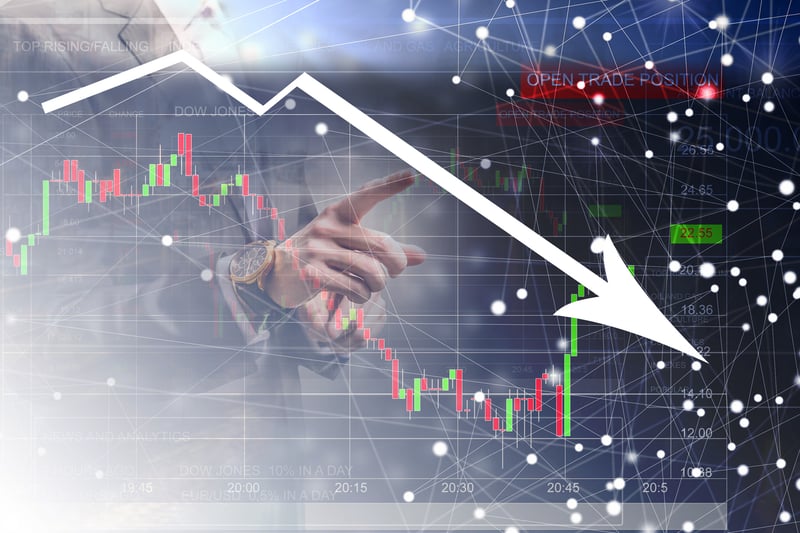What does Bible prophecy say about end-time economic conditions? How might today’s inflation and economic instability lead toward those conditions?
Jesus said that before His return there would be wars and rumors of wars, famines and disease epidemics (Matthew 24:6-7)—disasters that can destroy people’s lives and livelihoods and damage the world’s economy.
The book of Revelation prophesies a powerful yet sinister economic system that will control most of the world’s trade and produce great wealth (Revelation 18:9-19).
But this system will not mean wealth for everyone. It will restrict true Christians, who will not accept the “mark of the beast,” from even being able to buy or sell (13:16-17). Not only that, this system will actually enslave some people.
Ultimately, however, this system’s vast wealth will not spare it from its just punishment for sin. Eventually, people will recognize that no human form of wealth—whether it be paper money, cryptocurrency or even precious metals—will protect them from “the day of the LORD’s wrath” (Zephaniah 1:18).
After man’s best efforts to create a stable and affluent economy have utterly failed, Jesus Christ will establish the Kingdom of God on the earth. His government will bring the prosperity, economic stability and sustainable growth humanity has longed for (Isaiah 9:7; Micah 4:1-4).
In the light of these Bible prophecies, what is the world’s economic condition now, and how might it lead toward the fulfillment of these prophecies?
Inflation news
After decades when much of the world enjoyed low inflation, the scourge of spiraling prices has reappeared. Though the Bible doesn’t mention the economic term inflation, the curse of decreasing purchasing power is poignantly described by Haggai:
“He who earns wages, earns wages to put into a bag with holes” (Haggai 1:6).
Inflation today was kick-started by the pandemic and governments’ efforts to stimulate their economies. It has also been fueled by wars and rumors of wars in Ukraine and the Middle East.
BBC reported after Russia invaded Ukraine, “Inflation, which measures how fast the cost of living rises over time, hit 7.5% in January in the US—the highest level seen there since February 1982—and rose by 5.5% in the UK.
“But it could hit close to 10% in major Western economies if the cost of energy and food is pushed up by dwindling supplies caused by the Russian-Ukraine conflict, according to the Centre for Economics and Business Research.”
BBC noted that this might push central banks to increase interest rates, the traditional tool for fighting inflation. But higher interest rates create their own pain. In the U.K., for example, “about 2.2 million homeowners with mortgages linked to the Bank of England’s base rate would see repayments go up, putting further pressure on household budgets that are already being squeezed by the cost of living.”
What will be the results of Russia’s invasion of Ukraine? In its Feb. 26, 2022, edition, The Economist predicted:
“The immediate global implications will be higher inflation, lower growth and some disruption to financial markets as deeper sanctions take hold. The longer-term fallout will be a further debilitation of the system of globalised supply chains and integrated financial markets that has dominated the world economy since the Soviet Union collapsed in 1991.”
An earlier Economist piece, titled “Workers Have the Most to Lose From a Wage-Price Spiral,” noted that inflation can quickly become a vicious cycle.
“The longer inflation is too high, the more painful it could be to bring it back down. The wage-price spirals of the 1970s were contained only after tight monetary policy induced a global downturn in which American unemployment peaked at nearly 11%. If central bankers once again have to induce recessions to restore their credibility on inflation, workers will pay the price for that, too.”

Can recession be avoided? Stephanie Flanders highlighted some experts’ pessimistic reactions in Businessweek:
“‘My fear is that we are already reaching a point where it will be challenging to reduce inflation without giving rise to recession,’ said former U.S. Treasury Secretary Larry Summers . . .
“Plenty of others have joined Summers in the peanut gallery taking shots at the Fed, among them economist and Bloomberg columnist Mohamed El-Erian, who rates the Fed’s ‘transitory’ line on inflation ‘probably the worst inflation call in the history of the Federal Reserve’” (Jan. 11, 2022).
Hyperinflation fears
Inflation can be especially bad when it is unpredictable or out of control.
Germany in particular retains a strong aversion to inflation related to its experience with hyperinflation in the aftermath of World War I.
BBC published examples of how hyperinflation affected the people of Germany:
- “Prices ran out of control, for example a loaf of bread, which cost 250 marks in January 1923, had risen to 200,000 million marks in November 1923.
- “By autumn 1923 it cost more to print a note than the note was worth.
- “During the crisis, workers were often paid twice per day because prices rose so fast their wages were virtually worthless by lunchtime.”
Hyperinflation was most damaging to people on fixed incomes, and those who had savings or had loaned money soon discovered their money was worthless.
Hyperinflation isn’t just a thing of the past. Venezuela, Zimbabwe, Sudan and Lebanon have experienced very high inflation rates in recent years.
Though hyperinflation may not be a high risk for Western nations, its specter still strikes fear and can influence the economic course of nations. It reminds us why people might throw their money in the streets (Ezekiel 7:19).
Debt distress
More immediate than hyperinflation are the effects of a crushing burden of debt. During the pandemic, governments around the world poured money into preventing “another Great Depression, but they have also pushed up debt levels. In 2020, we observed the largest one-year debt surge since the second world war, with global debt—both public and private—rising to $226 trillion,” wrote Kristalina Georgieva, International Monetary Fund managing director, Feb. 16, 2022.
In order to buy and sell and enjoy the economic benefits of this end-time system, the Bible tells us people must receive “the mark or the name of the beast, or the number of his name.”
“We estimate that about 60 percent of low-income countries are in or at high risk of debt distress, double 2015 levels.”
It’s not just the low-income nations, though. Wealthy nations, including the United States, are deeply indebted. God warned that people who rejected His laws would become debtors at the mercy of lenders (Deuteronomy 28:44; Proverbs 22:7).
See more in our article “Is a U.S. Economic Collapse Coming?”
Economic volatility and instability
Each wave of war and rumor of war, each variant of the coronavirus, each disaster can send the financial markets into another roller coaster ride.
The inevitable but unpredictable clashes of rising and waning superpowers can also send the markets into a tizzy.
Even new technologies can shake the economy.
The Financial Times reported, “The emergence of digital currencies, both private and official, is shaking up domestic and international finance. This will yield many benefits but some things will remain much the same. There are risks, too, with developing economies potentially finding themselves on the wrong side of a widening global financial divide . . .
“New technologies spawned by the cryptocurrency revolution are making cheaper and practically instantaneous payment and settlement of transactions feasible” (“Digital Currencies Carry Threats as Well as Promises,” Feb. 14, 2022).
Many nations are jealous of the United States’ domination of the global financial system, and some are chafing under American sanctions. The dollar’s role as the reserve currency and U.S. influence over the SWIFT banking transaction system will continue to come under attack.
Could a digital version of the Chinese currency make inroads? The Financial Times noted, “The prospect of a digital renminbi being available worldwide has heightened concerns (or excitement) about the dollar finally receiving its comeuppance.”
Currently, the methods of getting around SWIFT have economic costs, and no currency is yet poised to be the natural successor to the dollar. But with the rapid pace of innovation, things could change rapidly.
Cryptocurrencies have been notoriously volatile. Still, recent events in Turkey show that “even a volatile cryptocurrency might be preferred to the local currency at times of economic turmoil” (The Financial Times).
Who knows what autocratic governments and financial innovators may develop?
With all the pain and difficulty caused by economic instability, people can be willing to give up some level of freedom in order to ensure more stability and less volatility. It seems the Bible describes such a scenario in the end times.
The end-time Babylon and the mark of the beast
As we saw at the beginning of this article, Jesus’ Olivet Prophecy predicted wars, rumors of wars and famines (Matthew 24:6-7). Revelation 6:5-8 tells about a time of scarcity and hunger illustrated with “extraordinarily high” prices for basic foods (NKJV Study Bible note on Revelation 6:5-6).
But in the midst of this, an economic powerhouse will bring stability and prosperity to Europe and many of its trading partners. Revelation 18 describes a wealthy and powerful trading empire in the tradition of ancient Babylon. John’s original readers would have also recognized the glories of the Roman Empire in his description of this power.
In order to buy and sell and enjoy the economic benefits of this system, the Bible tells us people must receive “the mark or the name of the beast, or the number of his name” (Revelation 13:17). People will be deceived by miracles (verse 13) and swayed by the financial benefits to accept this mark. (Study more about this in our articles “Mark of the Beast” and “666: The Number of the Beast.”)
However, the prosperity will not be enjoyed by everyone. Among the merchandise for sale will be the “bodies and souls of men” (Revelation 18:13)—end-time slaves. And those who reject the mark of the beast will be persecuted and excluded from the financial system.
In the end, God will clear up the deception and reveal this wealthy but evil system for what it is—a counterfeit of God’s Kingdom, based on greed and selfishness and under the influence of Satan the devil.
In its place, Jesus Christ will set up the real Kingdom of God—based on love and giving and the true worship of our gracious Creator. The Bible is full of prophecies of the abundance and peace this Kingdom will bring.
No longer will nations and peoples bear the burden of inflation, hyperinflation or debt. No longer will the economy wildly fluctuate. Volatility and instability will be replaced by stability and blessings.
Learn more about this future Millennium of peace in our booklet The World to Come: What It Will Be Like.
How to deal with financial worries
What does God advise us to do in these times of economic instability?
In the Sermon on the Mount, Jesus encouraged us to pray for God to “give us this day our daily bread” and for God’s Kingdom to come (Matthew 6:10-11). In the meantime, we are to store our most important treasures—our spiritual treasures—in heaven, where inflation and economic loss won’t occur (verses 19-21).
And we are encouraged not to worry about physical things, but to put first the Kingdom of God and His righteousness (verses 31-33). Read more about this section of Scripture in our article “Do Not Worry About Your Life” and related articles.
This doesn’t mean that we shouldn’t also strive to follow wise economic principles presented in the Bible. Learn more about these in the articles in our section on “Foundational Principles for Managing Family Finances.”
To study more about the end-time economic conditions, see our article “What Is the Future of the World Economy?”






